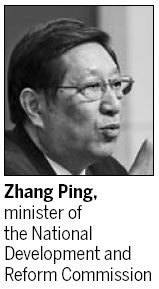China falls short in slashing energy use
Updated: 2012-03-06 07:24
By Lan Lan and Zhu Zhe (China Daily)
|
||||||||
China failed to attain its planned targets for slashing energy consumption and carbon emissions in 2011, highlighting the urgency of stepping up the country's economic structural shift, the head of the top economic planning agency said on Monday.
The country missed about half of its major targets for energy conservation and environmental protection in 2011, Zhang Ping, minister of the National Development and Reform Commission (NDRC), told journalists on the opening day of the Fifth Session of the 11th National People's Congress.
"There are a couple of complicated reasons for failing to meet the targets. The biggest is that we have not transformed the economic development model," he said.
Energy consumption for each unit of GDP growth for the year dropped 2.01 percent in 2011, about 1.2 percentage points lower than the planned target, while its carbon intensity - the amount of carbon emitted for each unit of economic growth - also missed the target due to its close linkage to energy consumption.
"The drought in southern areas is a major cause," Zhang said. China's hydro-electric energy generation decreased sharply owing to the shortage of rainfall, greatly increasing the use of coal.
|
 |
China also missed its target for nitrogen oxide emissions, an environmental indicator the country introduced last year. Nitrogen oxide rose by 5.7 percent, while the goal was to cut it by 1.5 percent.
At the same time, the country attained its targets for sulfur dioxide emissions, chemical oxygen demand and total ammonia nitrogen, Zhang said.
Sulfur dioxide emissions fell by 2.2 percent and chemical oxygen demand fell by 2 percent, surpassing the target by 0.7 percentage points and 0.5 percentage points.
Energy consumption and emissions reduction are largely linked with the ecological environment and efforts in coping with climate change, he said.
Zhang said the government is determined to make more efforts, and he said he is confident that the major targets set in the 12th Five-Year Plan (2011-15) could be achieved, he said.
From 2011 to 2015, China plans to slash its energy intensity by 16 percent and carbon emission intensity by 17 percent, compared with 2010.
Some local governments haven't fully realized the significance of energy saving, which has partly caused the failure to meet the target, said Xie Ji, deputy director of environmental protection and resources of NDRC. And economic restructuring also needs time, Xie said on the sidelines of the NPC session on Monday.
Xie said amid the complicated international and domestic economic situation, some local governments have been trying hard to strike a balance between keeping a rapid economic growth and meeting the energy conservation target.
Xie also told China Daily that in March or April, the top economic planner will send inspectors to all provincial-level administrative regions on the Chinese mainland to assess their performance on energy saving last year. Detailed results will be made public before June after being approved by the State Council, he said.
In November, the NDRC issued their highest level alert that provinces, including Jiangsu and Zhejiang, and the Inner Mongolia autonomous region, might miss their energy consumption targets. The Inner Mongolia autonomous region set an aggressive target of 15 percent year-on-year economic growth in 2012.
"Environmental protection is not a technical problem and the energy conservation projects were relatively efficient, but they need concerted efforts from all sides," said Zhou Dadi, former director of China's Energy Research Institute under the NDRC.
You may contact the writers at Lanlan@chinadaily.com.cn and zhuzhe@chinadaily.com.cn

 Relief reaches isolated village
Relief reaches isolated village
 Rainfall poses new threats to quake-hit region
Rainfall poses new threats to quake-hit region
 Funerals begin for Boston bombing victims
Funerals begin for Boston bombing victims
 Quake takeaway from China's Air Force
Quake takeaway from China's Air Force
 Obama celebrates young inventors at science fair
Obama celebrates young inventors at science fair
 Earth Day marked around the world
Earth Day marked around the world
 Volunteer team helping students find sense of normalcy
Volunteer team helping students find sense of normalcy
 Ethnic groups quick to join rescue efforts
Ethnic groups quick to join rescue efforts
Most Viewed
Editor's Picks

|

|

|

|

|

|
Today's Top News
Health new priority for quake zone
Xi meets US top military officer
Japan's boats driven out of Diaoyu
China mulls online shopping legislation
Bird flu death toll rises to 22
Putin appoints new ambassador to China
Japanese ships blocked from Diaoyu Islands
Inspired by Guan, more Chinese pick up golf
US Weekly

|

|






